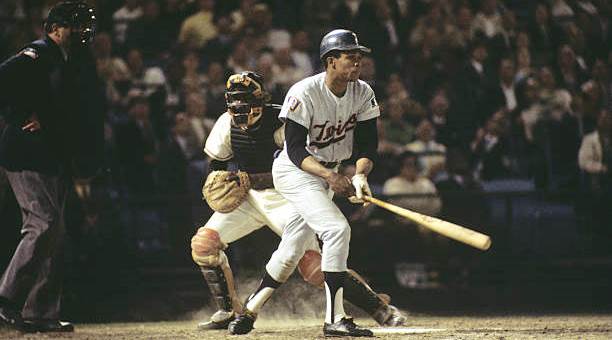MINNESOTA 4, CLEVELAND 2 IN CLEVELAND (16 INNINGS)
Date: Friday, July 25.
Batting stars: Rod Carew was 2-for-4 with a double, a stolen base (his sixteenth) and two RBIs. Cesar Tovar was 2-for-5 with a stolen base (his twenty-third) and two walks. Johnny Roseboro was 2-for-6 with a walk and two RBIs.
Pitching stars: Jim Perry pitched 6.2 scoreless innings, giving up four hits and a walk and striking out five. Ron Perranoski struck out six in 5.2 scoreless innings, giving up one hit.
Opposition stars: Jose Cardenal was 3-for-7. Sam McDowell pitched seven innings, giving up two runs on four hits and two walks and striking out five. Mike Paul pitched 7.1 innings, giving up two runs on four hits and three walks and striking out five.
The game: It was scoreless through six, and the only real threat came in the top of the sixth, when Tovar reached on an error, stole second, and went to third on a passed ball, getting there with one out. In the seventh, Frank Quilici and Rick Renick hit two-out singles, advanced to second and third on a wild pitch, and both scored on Roseboro's single.
The lead held until the ninth. Al Worthington allowed a leadoff walk to Ken Harrelson. With one out, Duke Sims hit a two-run homer to tie the score and send the game to extra innings.
From the tenth through the fifteenth the only threats were in the tenth, when the Twins put men on first and second with two out, and in the fifteenth, when they had a man on second with none out. In the sixteenth, Harmon Killebrew led off with a walk and Leo Cardenas hit a one-out double, putting men on second and third. With two down, Carew delivered a two-run double to give the Twins a 4-2 lead. The Indians went down in order in the bottom of the sixteenth.
WP: Perranoski (6-5). LP: Paul (2-8). S: None.
Notes: It was an odd defensive alignment, with Bob Allison in left, Tovar in center, Rick Renick in right, and Quilici at second base. I don't know if Billy Martin was playing a hunch or just decided to give some guys a day off against McDowell. It apparently had nothing to do with injury, as Ted Uhlaender, Tony Oliva, and Carew all entered the game for defense in the eighth inning and played the rest of the game. Quilici moved to third at that point, but later left the game for pinch-hitter Charlie Manuel. Manuel then went to left, with Uhlaender going to center and Tovar moving to third base.
It seems unusual for Martin to have taken Perry out of the game with a shutout going. Not saying it was a bad move, and it worked out, but it seems an out-of-character thing for him to have done.
It's also interesting that Martin chose Worthington to come into the game in the seventh to protect a 2-0 lead, rather than Perranoski. Perranoski had pitched two-thirds of an inning the night before, and before that was the all-star break, so he hadn't been overused lately. Worthington had been pitching well lately (other than giving up three runs in the July 19 game), so again, the point is not that it was a bad move. It just seems an interesting choice.
The 5.2 relief innings Perranoski pitched would be his longest outing of the year.
Mike Paul had been used as a spot starter by the Indians. While this was his longest outing of the year, he had twice gone seven innings and once six, so this was not completely unusual for him. He was twenty-four in 1969, in his second year in the majors, and had a fairly decent year: 5-10, 3.61, 1.35 WHIP. He followed that up with two pretty bad years, prompting the Indians to trade him to Texas after the 1971 season. He had the best season of his career for the Rangers in 1972, going 8-9, 2.17, 1.24 in 161.2 innings (49 games, 20 starts). He started the year in the bullpen but went into the rotation in July, pitching well in both roles. He struggled early in 1973, and one wonders if he might have clashed with new manager Whitey Herzog, as the Rangers don't seem to have had much patience with him. Despite his strong pitching in 1972 he was used as a swing man, then sent to the bullpen, then traded to the Cubs. He pitched well for the Cubs down the stretch, but after two ineffective appearances to start the 1974 season the Cubs simply released him. Paul certainly wasn't a star, but he was just twenty-nine and had some record of success. Still, that was the end of his major league career. He signed with Philadelphia and went 7-2, 3.32 for AAA Toledo, but did not even get a September call-up. He was in Toledo again in 1974, but did not pitch well. He then went to the Mexican League, where he played until 1982. He then became a minor league pitching coach and then a scout for many years. At last report he was still a scout for the Colorado Rockies.
Record: The Twins were 60-38, in first place in the American League West, three games ahead of Oakland.

